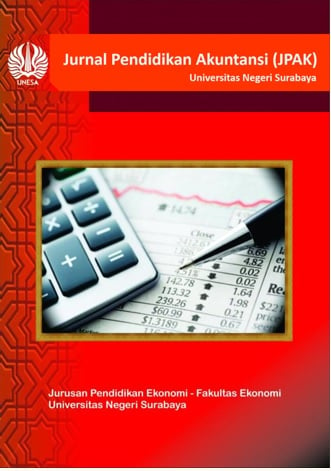Peningkatan Hasil Belajar Praktikum Akuntansi Menggunakan Model Problem Based Learning Pada Siswa Kelas XI AK 1 SMK Negeri 2 Buduran
DOI:
https://doi.org/10.26740/jpak.v11n1.p1-10Keywords:
Learning outcomes; practicum of accounting; problem based learningAbstract
The goal of this class action research is to find out the increase in learning outcomes of accounting practicum students in class XI AK 1 SMK Negeri 2 Buduran using the Problem Based Learning model. The research was conducted in two cycles where each cycle consisted of 4 stages, namely planning, action, observation and reflection. The research subjects were students of class XI AK 1 at SMK Negeri 2 Buduran with a total of 35 students. Data was collected through observation, tests and response questionnaires. Data analysis technique is to use quantitative descriptive. The results of the analysis were obtained from the analysis of teacher and student observations, analysis of student learning outcomes and analysis of student responses. The learning outcomes of students in cycle I to cycle II showed that there was an increase in student scores. These results can be seen from the average score of students which increased by 16.31 from 74.83 in cycle I to 91.14 in cycle II. The learning completeness of students also increased by 20%, from 60% or 21 students completed in cycle I to 91% or 32 students completed in cycle II. Based on the results of these data, it can be concluded that the learning process using the Problem Based Learning model can improve the learning outcomes of class XI AK 1 students at SMK Negeri 2 Buduran in the accounting practicum subject.
Downloads
Downloads
Published
How to Cite
Issue
Section
License
Authors who publish with this journal agree to the following terms:
- Authors retain copyright and grant the journal right of first publication with the work simultaneously licensed under a Creative Commons Attribution License that allows others to share the work with an acknowledgement of the work's authorship and initial publication in this journal.
- Authors are able to enter into separate, additional contractual arrangements for the non-exclusive distribution of the journal's published version of the work (e.g., post it to an institutional repository or publish it in a book), with an acknowledgement of its initial publication in this journal.
- Authors are permitted and encouraged to post their work online (e.g., in institutional repositories or on their website) prior to and during the submission process, as it can lead to productive exchanges, as well as earlier and greater citation of published work (See The Effect of Open Access).

Jurnal Pendidikan Akuntansi (JPAK) is licensed under a Creative Commons Attribution-NonCommercial 4.0 International License.
 Abstract views: 530
,
Abstract views: 530
, PDF Downloads: 587
PDF Downloads: 587



